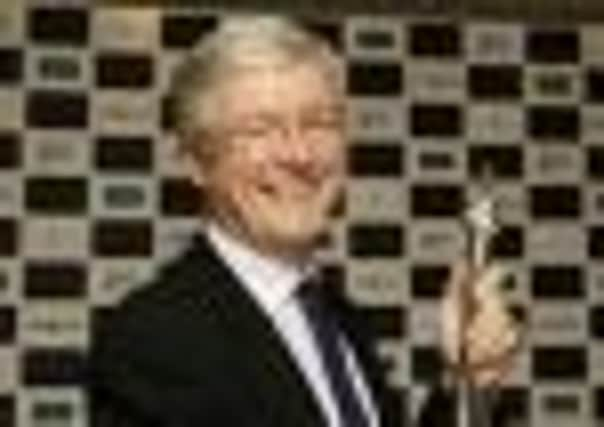Opera House boss Tony Hall enters BBC revolving door


He was handed the £450,000-a-year role after being directly approached by the BBC Trust, only 12 days since George Entwistle resigned from the post 54 days into his role.
The appointment of Lord Hall, a former BBC news executive who has been chief executive of the ROH since 2001, has been widely hailed for giving the corporation some welcome leadership.
Advertisement
Hide AdAdvertisement
Hide AdTim Davie will remain as the acting director-general until Lord Hall is able to take up the post next March.
Lord Patten, chairman of the BBC Trust, said Lord Hall was the “right person” to lead the BBC as it takes “a long, hard look at the way it operates and put in place the changes required to ensure it lives up to the standards that the public expects”.
The new DG - who was the only candidate contacted by the Trust - said: “I believe passionately in the BBC and that’s why I have accepted Lord Patten’s invitation to become director-general.”
The 61-year-old - made a cross-bench peer in 2010 - has retained his interests in broadcasting as deputy chairman of Channel 4.
Advertisement
Hide AdAdvertisement
Hide AdCulture Secretary Maria Miller said: “He has a very strong track record in successfully leading iconic organisations.”
And veteran broadcaster David Dimbleby said: “I think it’s a very good choice and a great relief for those of us who work for the BBC.”
Lord Hall will have to rebuild the BBC’s battered reputation after weeks of difficulties precipitated by the Jimmy Savile abuse scandal, and a subsequent report on BBC2’s Newsnight programme which mistakenly implicated Lord McAlpine in child abuse.
That mistake led to Mr Entwistle quitting his post and also saw the BBC settling with Lord McAlpine for £185,000 last week.
Advertisement
Hide AdAdvertisement
Hide AdPublic trust in the BBC is said to have been knocked by the furore and a number of inquiries are under way into the fallout from the Savile problems.
Lord Hall’s appointment came as BBC Trustee Anthony Fry was defending the payment of a full year’s salary of £450,000 to Mr Entwistle despite quitting just days after he took office - double the figure to which he would normally have been entitled.
Mr Fry told the Public Accounts Committee it had the right thing to do to avoid a protracted legal wrangle.
The direct approach for Lord Hall’s recruitment is a marked contrast to the team of headhunters that was involved in drawing up the list of candidates which resulted in Mr Entwistle being given the post.
Advertisement
Hide AdAdvertisement
Hide AdLord Patten said of the fast-track appointment, unanimously agreed by Trustees: “We might have considered going through the whole lengthy recruitment process again with a new round of advertisements and another global hunt for candidates.
“But I believe the approach we have taken is ultimately in the interests of the BBC and, most importantly, licence fee-payers as we have got the best candidate and he will help the organisation quickly get back on an even keel.”
Birkenhead-born Lord Hall, who began as a news trainee with the BBC 39 years ago, is thought to have been in the running for the director-general post when Greg Dyke was appointed in 1999. He was not an applicant when the position was vacated by Mark Thompson earlier this year.
Lord Patten continued: “While there are still very serious questions to be answered by the ongoing inquiries, it is in the interests of licence fee-payers that the BBC now starts to refocus on its main purpose - making great programmes that audiences love and trust.
Advertisement
Hide AdAdvertisement
Hide Ad“In doing this, it will need to take a long, hard look at the way it operates and put in place the changes required to ensure it lives up to the standards that the public expects. Tony Hall is the right person to lead this and I am delighted that he is taking on this role.”
Lord Hall, who was head of BBC news and current affairs from 1996 to 2001, acknowledged it had been a “difficult few weeks” but said he wanted to lead a “world-class BBC”.
He said: This organisation is an incredibly important part of what makes the United Kingdom what it is. And, of course, it matters not just to people in this country, but to tens of millions around the world too.
“It’s been a difficult few weeks - but together we’ll get through it. I’m committed to ensuring our news services are the best in the world.
Advertisement
Hide AdAdvertisement
Hide Ad“I’m committed to making this a place where creative people, the best and the brightest, want to work.
“Having the right teams working together, sparking off each other, is key. And I want to build a world-class team to lead a world-class BBC.”
Question Time host Dimbleby, who recently complained the BBC is “still over-managed and the management still speak gobbledegook”, suggested it would be a popular move.
“I think most people will be thrilled at this choice and will also get the leadership that is needed from somebody who is a creative man and a good administrator - and a calm man in a time of crisis,” he said.
Advertisement
Hide AdAdvertisement
Hide AdLord Hall was credited with turning around the fortunes and public perception of the once troubled Opera House.
Simon Robey, who chairs the Royal Opera House’s board of trustees, said: “I can think of nobody better able to bring stability back to the BBC. They see, as we do, his qualities of leadership and his depth of relevant experience.”
Mark Byford, a former BBC deputy director-general, told Radio 4’s World At One that he was “an outstanding appointment”.